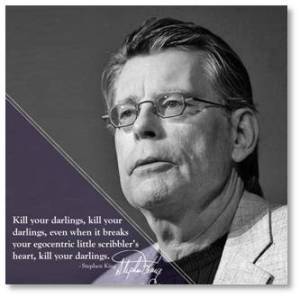 I have been writing for many years. I’m not going to tell you how many because I’d rather not think about how much ink has flowed under the bridge but suffice it to say that writing has been a large part of my life. Before I even knew my letters I scribbled nonsense on a white-lined pad with an old-fashioned pen and a bottle of blue ink. Why? It just felt good.
I have been writing for many years. I’m not going to tell you how many because I’d rather not think about how much ink has flowed under the bridge but suffice it to say that writing has been a large part of my life. Before I even knew my letters I scribbled nonsense on a white-lined pad with an old-fashioned pen and a bottle of blue ink. Why? It just felt good.
I published my first novel in 1988 and my second novel in 1992. At that point, I assumed I would just continue this pace and level of productivity. That didn’t happen. My agent rejected my third novel and I needed to find out why. So I joined the SpaceCrafts Writers Group and have been a member ever since. The folks at SpaceCrafts identified the problem with my writing very quickly and I should have then rewritten that novel and moved on. I didn’t do that. Instead I shelved that manuscript and started another one.
Over the years I got caught up with my career and my family and wrote less fiction. That fourth manuscript moved to the back burner. Besides, there was plenty of writing to do in one job or another: brochures, web content, email and advertising copy, newsletters, blog posts, etc. I even won an award for a brochure that I wrote for one of the high tech companies that employed me. I say all this not to pat myself on the back but to establish my bona fides as a writer.
If I Could Only Find the Time
When my novels first came out, an astonishing number of people would confide to me that they were (1) writing a novel themselves, (2) always wanted to write a novel, or (3) planned to write a novel some day . . . if they could either [a] find the time, [b] take a sabbatical to devote to writing, [c] plot it all out on index cards, or [d] just write the perfect first sentence.
 One man even told me that he couldn’t get past that first sentence because Herman Melville had set the precedent with his first novel, Moby Dick. He was shocked when I informed him that Moby Dick was not Herman Melville’s first novel (it was #6) and that one could write an entire first draft and then go back and rewrite the first sentence. This had never occurred to him. (Personally, I have never thought, “Call me Ishmael” all that great as a first sentence. Lots of authors have written better ones than that.
One man even told me that he couldn’t get past that first sentence because Herman Melville had set the precedent with his first novel, Moby Dick. He was shocked when I informed him that Moby Dick was not Herman Melville’s first novel (it was #6) and that one could write an entire first draft and then go back and rewrite the first sentence. This had never occurred to him. (Personally, I have never thought, “Call me Ishmael” all that great as a first sentence. Lots of authors have written better ones than that.
Some of these wanna-be authors would ask me for advice on how to proceed and this is what I told them:
Seven Ways to Become a Writer
- Make the time: Don’t wait to find the time, take a sabbatical, get the kids into college or retire to begin writing. You have to make the time. Just as with anything worth doing, you have to put it into your schedule and honor that schedule. Don’t procrastinate and don’t find other things to do that take precedence. They will always be there if you’re looking for them.
- Just write: Start putting words down on paper or your computer screen, whichever is comfortable for you. It will probably be a combination of the two because, once those words start to flow, they will keep on coming. Keep pens and paper handy in your purse, your car, your gym bag, whatever, so you can record an idea or a phrase while it’s fresh. (Don’t type it on your smart phone. It encourages brevity when you want to get that flow going.)
- Forget perfection: The words you put down don’t automatically move onto a printed page and get bound between covers. Writing gives you the luxury of rewriting. Don’t worry about whether you are crafting perfect words, perfect sentences or perfect paragraphs. Don’t worry about whether you have a completely clear vision of all your characters. Just start writing.
- Use the right tools: You wouldn’t hire a carpenter who didn’t know how to use a hammer and a level or a plumber who didn’t know which end of a wrench to hold. A writer has to have the same command of his/her tools. Those tools are words, spelled properly, along with grammar, and punctuation. If you can’t be bothered to do this and think your brilliant ideas and great creativity will make up for it, think again. Any magazine or publisher will spot these mistakes from a mile away and chuck your brilliant prose in the circular file. Even in e-publishing, good language makes a difference. Most people will rate bad writing as the work of an amateur—and they would be right. If you want to be a professional, take the time to learn the tools of your craft.
- Be open to changes: As you write, new ideas will pop up, story arcs will change, plot devices will become clear and—most of all—characters will take on a life of their own. If you have ever heard an author say this and found it had to believe, well, it’s true. I once had a background character push and shove his way forward until he was one of the main people. Good guys will turn around and give you a wink that lets you know they have shadowy motives underneath their bonhomie. Bad guys might redeem themselves at the last minute. Don’t fight it, just put it all down.
 Kill your darlings: This is a common phrase in writing and one that every author understands. Still, it can be a difficult rule for even experienced writers to follow. You write a paragraph or a chapter that you really love. You enjoyed living in that place or with those people while you wrote it. You think that turn of phrase is brilliant. You find all that detail fascinating and put in as much as you can. Then someone critiques your pages and tells you that it doesn’t work: that place is a diversion, the turn of phrase is overwritten, the detail is boring. They tell you to cut it but you don’t want to. Cut it. Trust me. Kill it and move on.
Kill your darlings: This is a common phrase in writing and one that every author understands. Still, it can be a difficult rule for even experienced writers to follow. You write a paragraph or a chapter that you really love. You enjoyed living in that place or with those people while you wrote it. You think that turn of phrase is brilliant. You find all that detail fascinating and put in as much as you can. Then someone critiques your pages and tells you that it doesn’t work: that place is a diversion, the turn of phrase is overwritten, the detail is boring. They tell you to cut it but you don’t want to. Cut it. Trust me. Kill it and move on.- Find objective readers: Whatever you do, don’t depend on your family members to critique your work. They are your worst possible reviewers because (a) they want you to be happy, (b) they’re going to pull their punches so you’ll be happy, and (3) they don’t really know anything about writing. They’ll tell you everything is wonderful when it’s not and that doesn’t help you. Instead, find a group of people who write, know something about the subject of your writing, or can give you expert advice, and who won’t worry about whether that’s going to make you happy. Then listen to them and take their advice to heart.
There’s more—lots more. Many people have written whole books on the craft of writing. Websites and blogs are dedicated to it. You can find a short list of these materials and sites on the Writing Resources page of the SpaceCrafts website.
If you know someone who fits the description above, please forward them this post. Maybe it will help them to get started and keep going.
Meanwhile, my fourth novel is sitting, unfinished on a thumb drive despite my best intentions. Over the years I got distracted by writing short stories—about 22 of them so far—but submitted them for publication only sporadically. Not until this year did I get serious about it and now have two stories appearing in upcoming anthologies with several others out for review in different magazines. Next I have to make the time to write Chapter 34 of my novel and then keep on going. But procrastination bites me, too. Today, for example, I wrote this post instead of Chapter 34. Help!
